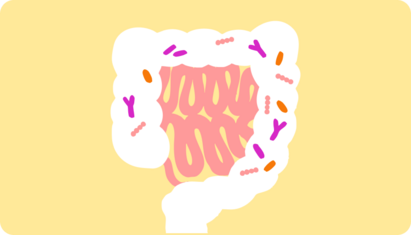The connection between the microbiome and mental health



Published October 2, 2023

Between sessions, writing progress notes, and dealing with insurance and invoices, being a behavioral health clinician isn’t easy. It can be difficult to find time to take a moment for yourself—especially if you have a packed schedule and only a few minutes between sessions.
In part due to the high demands of their jobs, many therapists these days are dealing with burnout and compassion fatigue. According to SimplePractice’s 2023 Therapist Burnout Survey results, 52% of practitioners reported that they have experienced burnout in the past year.
In celebration of World Mental Health Day, and in response to these survey results, SimplePractice created a campaign with free resources to support clinicians with burnout.
You may recommend meditation as a way for your clients to relieve stress, but it’s important for you to carve space into your busy schedule for self-care practices like meditation as well.
“Meditation serves as an anchor in the midst of all the inevitable stress of being a therapist,” says Elisha Goldstein, PhD, psychologist and creator of The Mindful Living Collective. “By teaching us to respond rather than react, we can protect ourselves against the negative effects of chronic stress.”
Keep reading to learn how meditation can be beneficial, along with eight guided meditations you can use to recenter yourself between sessions, energize yourself at the start of the day, or decompress at the end of the day.
The unfortunate truth is that work stress and burnout don’t just affect you—they can also affect the quality of care you provide to your clients.
According to SimplePractice’s Therapist Well-Being Report, clinicians surveyed reported that the top contributors to high levels of burnout included work-life balance challenges, administrative burdens, and compassion fatigue.
People in the mental health or caregiving fields are especially prone to compassion fatigue and burnout. Therapists need to listen and provide an empathetic ear to their clients’ pain and suffering—but sometimes, this can become overwhelming, making it difficult to empathize with patients.
“Therapists are in the unique position of bearing witness to the personal vulnerabilities and struggles of others,” says Goldstein. “This can be both rewarding and draining.”
The good news is that there is strong evidence that a mindfulness practice can reduce burnout among healthcare professionals.
In one pilot study, researchers looked at the effects of a structured, six-week mindfulness program on healthcare professionals who worked at an outpatient community mental health clinic. They found that the program could help clinicians by reducing emotional reactivity, and fostering deep listening and communication.
To achieve better work-life balance, meditation can serve as a moment to pause and regroup between sessions. You can then come back to your work feeling refreshed, present, and be able to fully engage with clients or tasks in front of you.
Meditation also has several benefits that can help you when you’re in session with clients.
According to Goldstein, “meditation supports awareness of countertransference so we see more clearly into the experience of our clients.”
“This not only makes us more effective at what we do, but also shields us from vicarious trauma and compassion fatigue, ensuring we can serve our clients sustainably and wholeheartedly,” Goldstein continues.
One study suggests that meditation can enhance attention, memory, mood, and emotional regulation—and it doesn’t need to take up much time either. Brief, daily meditation can have the same benefits.
“While many people find solace in a morning routine, setting intentions and grounding ourselves for the day ahead, we can also find value in brief meditation sessions between clients,” says Goldstein. “These short breaks can serve as a mental cleanse, ensuring we approach each session refreshed, grounded, embodied, and present.”
These bespoke meditation sessions, designed by Goldstein, are meant to be integrated into your workday.
Taking the time to complete a short meditation can help reduce and prevent burnout and work stress without getting in the way of the work you do with your clients—and potentially help you stay present in your sessions.
The great thing about meditation is that it’s versatile. These eight meditations range from three minutes to 20 minutes, and can be done seated or lying down, at home, or during breaks at your office.
This short check-in is perfect for when you are low on time, but need a break to reset between sessions.
Grounding can help you connect back to your body and focus on the present moment, plus this practice only takes three minutes.
Take four minutes to move to a comfortable position, find a quiet location, and get in-tune with your body for the most efficient route to relaxation.
This meditation can help you with attention and presence, especially if you feel like you are unable to focus on clients or tasks throughout the workday.
Providing yourself with compassion is just as important as the compassion you give to your clients. “By incorporating meditation, we, as therapists, can cultivate a heightened sense of empathy, not only for others, but also for ourselves to prevent burnout,” says Goldstein.
If you have 20 minutes to spare, take the time to practice gratitude, while relaxing from head to toe, with this body scan meditation.
This loving kindness meditation has been called the “antidote to fear.” It uses visualization to increase your positive emotions and your connections with others.
This meditation can help enhance your positive feelings toward yourself and others, with personal growth and expansion of joy as the goal.
Whether you only see a few clients per week or you have a full client caseload, it’s essential to take time for yourself throughout your day. When it comes down to it, you need to take care of yourself before you can take care of others.
“I like to think of meditation as a gym for the mind—a playful space for strengthening our mental muscles of attention, awareness, and compassion,” says Goldstein.
“If you’re grappling with burnout, know you’re not alone and meditation can become a path back to personal control and balance. You can even begin to rediscover the joy in your work,” Goldstein advises.
Check out the other articles, courses, and resources that SimplePractice created to support clinicians experiencing burnout this World Mental Health Day.
SimplePractice is HIPAA-compliant practice management software with everything you need to run your practice built into the platform—from booking and scheduling to insurance and client billing.
If you’ve been considering switching to an EHR system, SimplePractice empowers you to run a fully paperless practice—so you get more time for the things that matter most to you.
Try SimplePractice free for 30 days. No credit card required.

Kristen Garafano is the Managing Editor at SimplePractice. Her writing has appeared on Healthline, Patch, Seventeen, and more.
Proudly made in Santa Monica, CA © 2025 SimplePractice, LLC
Proudly made in Santa Monica, CA © 2025
SimplePractice, LLC